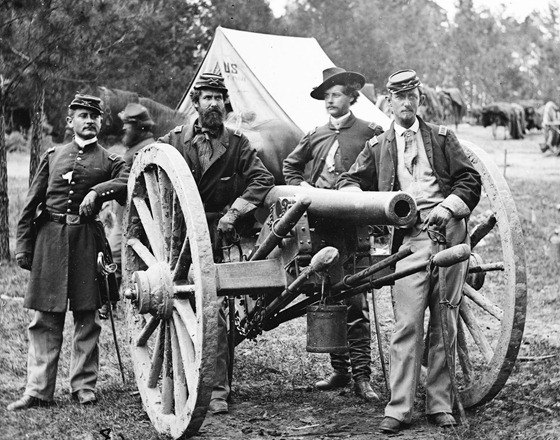From Wikipedia:
The Horse Artillery Brigade of the Army of the Potomac was a brigade of various batteries of horse artillery during the American Civil War.
Made up almost entirely of individual, company-strength batteries from the Regular Army’s five artillery regiments, the Horse Artillery operated under the command umbrella of the Cavalry Corps. The Horse Artillery differed from other light artillery (also known as “mounted” artillery) in that each member of the unit traveled on his own horse, rather than the traditional light artillery practice of some riding horses, while others rode on the limbers and caissons, with still others traveling on foot. With each man on his own horse, the unit could travel faster and more efficiently. It was the brainchild of former artillery captain and Brig. Gen. William Farquhar Barry, Chief of Artillery for the Army of the Potomac, in 1861. With such a large percentage of the U.S. Horse Artillery being artillery batteries from the regular U.S. Army, it developed a superb reputation for military efficiency, accuracy of fire, and command presence in the field and in battle.
Battery A, 2nd U.S. Artillery (2nd Regiment of Artillery)
Commander: Captain John C. Tidball, USA, of Ohio
- Lead (Right) Section Chief: First Lieutenant Alexander Cummings McWhorter Pennington, Jr., USA, of New Jersey
- Rear (Left) Section Chief: First Lieutenant William Neil Dennison, USA, of Ohio
- Center Section Chief: Second Lieutenant Robert Clarke, USA, of Pennsylvania
From Library of Congress:
Title:Fair Oaks, Va., vicinity. Lt. Robert Clarke, Capt. John C. Tidball, Lt. William N. Dennison, and Capt. Alexander C.M. Pennington
June 1862
Photographed by James F. Gibson
Photograph from the main eastern theater of war, the Peninsular Campaign
Civil War glass negative collection. Library of Congress Prints and Photographs Division Washington, D.C. 20540 USA
Record page for this image: http://www.loc.gov/pictures/item/cwp2003000078/PP/





